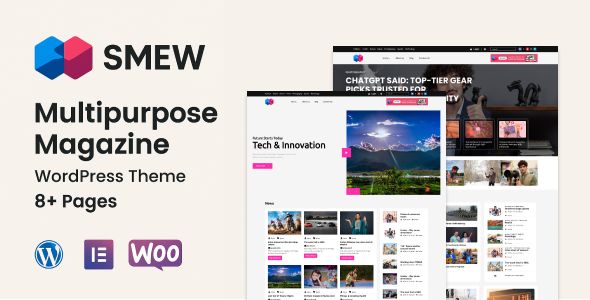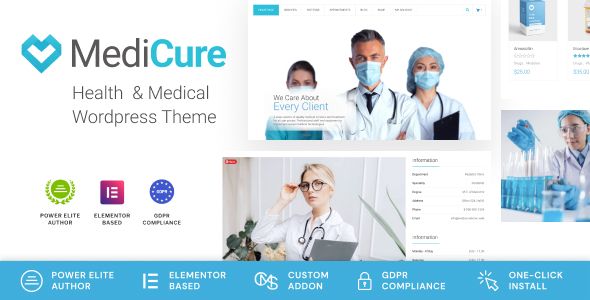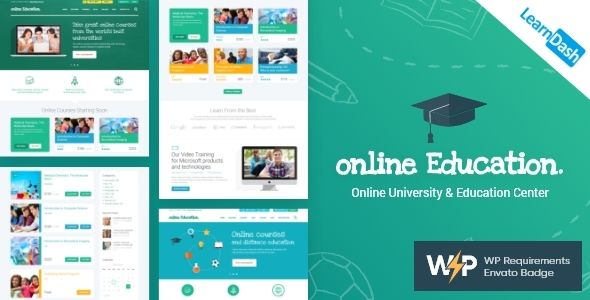Unipix – University Education WordPress Theme + RTL

- Description
- Reviews
- FAQ

Unipix – University Education WordPress Theme + RTL
Universities don’t run on a single website. You have a public-facing home, faculty pages, program microsites, admissions funnels, research centers, alumni networks, and a constant stream of events and news that need to go live today, not after a license handshake. This release of Unipix – University Education WordPress Theme + RTL is shaped for that reality: it’s ready to use right after install, includes all Pro features, stays synced with the official release, and can be deployed on unlimited sites under one straightforward ownership model. In plain terms, your teams can spin up a main university hub, school-level subsites, lab pages, and campaign landers—without counting seats or copying keys—while preserving the full premium experience students, faculty, and donors expect.
Why this ownership model fits higher education
Academic web teams juggle competing timelines: admissions needs a landing page for early decision, the Business School wants a branded microsite for an executive program, the library is rolling out a new discovery service, and alumni relations is pushing Giving Day. Traditional licensing multiplies that work with activation steps you don’t have time for. With this Unipix – University Education WordPress Theme + RTL build you get:
-
Unlimited sites for colleges, departments, research centers, outreach programs, and staging.
-
All Pro features included—not a cut-down demo—so you stop hacking around missing blocks.
-
Ready to use after install so editors can assemble pages immediately.
-
Updates synced with the official release for predictable maintenance and compatibility.
The result is faster launches, fewer roadblocks, and a unified design system across your institution.
Who Unipix serves best
-
Comprehensive universities that operate multiple colleges (Arts & Sciences, Engineering, Medicine, Business, Law).
-
Community and technical colleges balancing program discovery with practical admissions steps.
-
Graduate and professional schools with specialized accreditation pages and faculty research profiles.
-
Institutes and research centers publishing labs, projects, publications, and grants.
-
Continuing education & executive programs that need conversion-focused landers and clean checkout flows.
-
International campuses that require multilingual and RTL support plus region-specific content.
If your web presence must help people discover programs, trust your institution, and complete tasks (apply, register, give, visit)—Unipix – University Education WordPress Theme + RTL is tuned for it.
Design language: academic credibility with modern clarity
University sites should feel scholarly without looking dated. Unipix pairs editorial polish with quiet conversion cues:
-
Elegant typography with a legible scale for long-form policy pages and quick-scanning admissions content.
-
Generous spacing that keeps dense information breathable on mobile.
-
Composed hero systems that adapt to different goals: “Apply,” “Visit,” “Give,” “Request Info,” “Explore Programs.”
-
Tactile micro-interactions—hover states, focus outlines, smooth anchor links—kept GPU-friendly for performance.
-
Contrast-true palettes suitable for brand colors while meeting accessibility targets.
-
RTL-ready layouts that mirror gracefully for Arabic, Hebrew, and Persian content.
The interface projects competence, which quietly boosts conversion and trust across student and faculty audiences.
Information architecture that maps to real academic journeys
A typical navigation model for Unipix – University Education WordPress Theme + RTL looks like this:
-
Home — Mission in a line, prominence for Apply/Visit/Give, quick links to programs, research highlights, rankings, and news.
-
Academics — Program finder; degree level filters (Undergraduate, Master’s, Doctoral, Certificates); specialized accreditation notes.
-
Admissions & Aid — Requirements, deadlines, cost & aid explainers, visit events, request info forms, and admitted-student steps.
-
Research — Labs, centers, projects, publications, grants, and equipment cores with booking notes.
-
Student Life — Housing, dining, health & counseling, student orgs, athletics, arts, service learning.
-
About — Leadership, history, accreditation, diversity statements, campus maps, facts & figures.
-
Faculty & Staff — Directory with profile pages, office hours, syllabi attachments, and publications.
-
News & Events — Filterable newsrooms and a calendar with RSVP/registration.
-
Give — Campaign pages, impact stories, donor recognition, recurring gift prompts.
-
Contact — People, offices, hours, and a short general inquiry form.
Because this build is ready after install, you can scaffold that structure immediately and iterate in place as your calendar shifts.
Program discovery that actually converts
Prospective students arrive with questions: Which programs exist? What do they cost? What careers do graduates get? Unipix ships opinionated blocks so answers appear where decisions happen:
-
Program Finder with keyword search and filters (level, field, format, campus, start term).
-
Program pages with concise overview, curriculum snapshot, outcomes with alumni roles, faculty leads, and application steps.
-
“At a glance” panel: length, credits, delivery (on-campus/hybrid/online), tuition band, next start date.
-
Sample curriculum with 6–10 representative courses and a short outcomes paragraph.
-
Career trajectories with 3–6 roles and typical salary bands (you provide data).
-
Application CTA persistent near the fold: Apply / Request Info / Attend Info Session.
These patterns shorten the distance between curiosity and action without drowning visitors in jargon.
Admissions & financial aid: calm guidance, fewer calls
Admissions pages should feel like a capable counselor, not a wall of regulations:
-
Deadlines table with Early Action, Regular Decision, and Graduate Round dates (export to calendar).
-
Requirements summarized in bullets with links to details (transcripts, testing policy, essays, portfolio, recommendations).
-
Cost & aid explainers with net price concepts in plain English and a short glossary (COA, EFC/SAI, merit vs. need-based).
-
Visit pages that unify campus tours, virtual info sessions, and counselor drop-ins.
-
Admitted-student checklists (deposit, housing, orientation, immunizations) presented as steps.
Clear copy and layout reduce repetitive phone calls and emails to your front desk.
Research & faculty profiles that attract grants and grad students
Serious students and funders judge by the depth of your research story. Unipix provides a credible scaffold:
-
Lab/Center pages with mission, current projects, equipment lists, and sample publications.
-
Faculty profiles with photo, title, research interests, selected works, funding highlights, courses taught, office hours, and contact.
-
Publications components that accept citations in your preferred style; include DOI fields if you publish them.
-
Open positions (postdoc/RA/PhD) as a simple, filterable list with application routes.
-
Seminar series slot with upcoming talks, abstracts, and speaker bios.
This structure helps prospective grad students and collaborators find their way without relying on email introductions.
Events & calendars that respect academic life
Calendars aren’t all the same. Unipix offers patterns for lectures, admissions info sessions, performances, athletic events, and deadlines:
-
Unified calendar with filters (type, school, campus, online/in-person) and export-to-calendar.
-
Event pages with registration state, room map, capacity note, livestream placeholder, and accessibility statement.
-
Conference mini-sites for symposia: program schedules, speaker pages, sponsor tiers, and recap mode post-event.
-
Deadline blocks for add/drop, thesis submission, financial aid, and graduation applications.
When calendars are in order, support tickets go down and attendance goes up.
Student life presented as real, practical value
Student Life is more than glossy photos:
-
Housing with residence hall snapshots, floor plans, amenities, and application dates.
-
Dining with venues, menus (if you integrate), hours, and dietary notes.
-
Health & counseling summarized with hours and emergency guidance.
-
Transportation & parking with maps and permit details.
-
Clubs & orgs directory with categories, meeting times, and contact routes.
-
Career services with resume clinics, mock interviews, internships, and fair dates.
These pages answer daily questions quickly so students can spend time learning—not digging.
Newsroom & storytelling that earns attention
Unipix treats content like a first-class citizen:
-
News listing with tags (research, awards, athletics, alumni, community) and a featured spotlight.
-
Article pages with strong type hierarchy, pull quotes, inline media, and related links.
-
Media kits with downloadable logos, boilerplate, and press contacts.
-
Research highlights and grant announcements arranged for alumni and donors as well as peers.
Your stories deserve an editorial stage; Unipix keeps it fast and readable on phones.
Donor experience that feels personal
Giving pages should make the case simply and respectfully:
-
Campaign home that answers “Why now?” in two paragraphs.
-
Impact stories grouped by funds (scholarships, research, facilities, emergency aid).
-
Recognition that’s tasteful, opt-in, and easy to maintain.
-
Recurring gift nudges placed near the button, not as a pop-up.
-
Employer match guidance with a short explainer.
The tone remains human and on-brand, which increases conversion and satisfaction.
Accessibility & performance: quiet signals of integrity
Universities should model good web citizenship. Unipix – University Education WordPress Theme + RTL helps you start from a strong baseline:
-
Semantic HTML with real headings and landmark roles for screen readers.
-
Visible focus states and predictable keyboard navigation.
-
Color contrast suitable for brand palettes that still meet readability standards.
-
GPU-friendly motion (transform/opacity) so low-power laptops and phones stay smooth.
-
Disciplined media (responsive images, aspect-ratio locks) to prevent layout shift and keep Core Web Vitals healthy.
Accessibility is built in as a habit, not a checklist item.
Editor experience for decentralized teams
Universities thrive on distributed authorship. Unipix gives non-technical editors safe, efficient tools:
-
Reusable sections: hero, program cards, deadlines, faculty lists, publications, stats bands, FAQs, testimonials.
-
Global style tokens: typography, color, spacing—set once, inherit everywhere.
-
Header/footer builders to enforce navigation standards across subsites.
-
Template cloning to spin up a new department site from a working model in minutes.
-
Content guardrails that keep layouts stable even when text lengths vary.
Your central web team can set rules; departments can publish confidently within them.
Multilingual & RTL support done right
International recruitment and research require real localization:
-
Translation-friendly strings throughout; nothing important baked into images.
-
Language switcher surface that’s understandable to non-technical audiences.
-
RTL layouts that mirror cleanly for right-to-left languages.
-
Regional microsites for overseas campuses or partnerships using the same design system.
The ability to deploy unlimited sites means localization projects aren’t blocked by licensing math.
Governance & consistency at scale
Design governance is easier when the system cooperates:
-
Brand tokens (colors, type, spacing) that lock to institutional standards.
-
Component library with pre-approved variations—no off-brand improvisation.
-
Editorial guidance baked into placeholders and helper text.
-
Audit-friendly: consistent headers/footers and global policy links on every site.
You protect brand integrity while empowering subject-matter experts to publish.
SEO & discoverability for academic content
Searchers want programs, deadlines, and people:
-
Clean slugs and structured breadcrumbs:
/academics/ba-psychology,/faculty/maria-chen,/research/center-for-climate-science. -
Schema for articles, FAQs, and events where it helps.
-
Internal link webs that connect program pages with faculty, labs, and news features.
-
Media discipline so important pages don’t lose mobile rankings to heavy assets.
-
Evergreen content strategy: guides like “How to apply for need-based aid,” “What is a statement of purpose?” and “Undergraduate research 101.”
Consistency wins; Unipix provides the scaffolding to publish steadily.
Launch blueprint (fast, credible v1 in three focused days)
Day 1 — Skeleton & Standards
-
Install Unipix – University Education WordPress Theme + RTL (it’s ready to use after install).
-
Set global styles (type scale, color tokens, spacing).
-
Publish Home with hero, program finder, outcomes stats, and three news items.
-
Create Academics index and one sample program page.
-
Add Admissions & Aid with deadlines table and a simple “Request Info” form.
Day 2 — Depth & People
-
Build Research with two lab pages and one faculty list.
-
Add a Student Life hub with Housing, Dining, and Health & Counseling.
-
Create News & Events and publish four real stories and a week of events.
-
Ship About: leadership, accreditation, campus map.
Day 3 — Conversion & Polish
-
Launch Give with one campaign page and two impact stories.
-
Add three more program pages and a filterable program finder surface.
-
Mobile QA across program pages, admissions steps, events, and forms.
-
Compress images; validate focus states and tab order; check RTL on a sample page.
You’ll have a grounded, conversion-capable presence ready for admissions season.
Migration tips (switching to Unipix mid-year)
-
Inventory high-traffic URLs (programs, admissions, calendar) and preserve slugs where possible.
-
Recreate global styles first to maintain brand feel.
-
Standardize faculty images (ratio, size) to reduce jitter on directories.
-
Move signature programs first; let long-tail pages follow.
-
QA forms, deadline tables, and program finder filters on mobile before sending traffic.
-
Resubmit your sitemap; spot-check indexation and structured data.
Done carefully, you retain rankings and dramatically improve UX.
Troubleshooting quick list
-
High exits on program pages → Move “At a glance” above the fold; add next start date and a two-line career outcomes summary.
-
Admissions calls about deadlines → Surface a global deadlines widget; add “add to calendar” links.
-
Thin faculty profiles → Require research interests + two selected publications and a headshot before publishing.
-
Low event attendance → Add “Add to calendar” and RSVPs; send day-of reminder via your comms stack.
-
Mobile performance dips → Right-size hero images, lazy-load galleries, avoid heavy third-party scripts.
-
Inconsistent subsites → Lock brand tokens globally; provide a starter template with approved sections only.
Small structural adjustments usually beat sweeping redesigns.
Why choose Unipix over a generic multipurpose theme
You can bend a general theme into a university site, but you’ll spend months rebuilding common patterns. Unipix – University Education WordPress Theme + RTL already includes:
-
Program finder and program-page scaffolds that emphasize outcomes and steps.
-
Admissions & aid patterns with deadlines, requirements, and clear CTAs.
-
Research & faculty templates suitable for grants and graduate recruiting.
-
Event & calendar components built for academic life.
-
Newsroom/editorial layouts that respect long-form reading.
-
Governance aids (tokens, reusable sections) to keep many sites on-brand.
-
RTL and multilingual readiness for global operations.
-
All Pro features, unlimited sites, ready after install, updates synced for predictable maintenance.
Less time fighting structure; more time serving students and faculty.
Long-term maintenance (predictable updates)
Because this build tracks the official release:
-
Back up before updating.
-
Update through the dashboard like any premium theme.
-
Review change notes; spot-check program finder, admissions forms, events, and faculty directories.
-
Regression test mobile on a sample of heavy pages (news feature, program page, calendar).
You’ll keep moving at the pace of your academic calendar without maintenance surprises.
Final word
A great university site makes discovery effortless, decisions clear, and pride visible. Unipix – University Education WordPress Theme + RTL gives you the scaffolding to do that—across the entire institution—with a practical ownership model. It’s ready to use after install, includes all Pro features, stays synced with the official release, and supports unlimited sites. Build a credible hub, launch program pages that convert, publish research stories that travel, and keep calendars honest. Do those things consistently and your web presence will compound in value—one cohort, one grant, one donor, one story at a time.
FAQ
Q1: What exactly is included with this build of Unipix – University Education WordPress Theme + RTL?
The complete premium theme with all Pro features intact. It’s ready after install, kept in step with the official release for updates, and usable on unlimited sites.
Q2: Is this a limited “lite” edition?
No. You get the full component set: program finder, program page templates, research/lab pages, faculty directory and profiles, events/calendar, newsroom, student life blocks, and more—plus RTL support.
Q3: Can we deploy separate college or department sites without new licenses?
Yes. The usage model allows unlimited sites, ideal for colleges, departments, labs, and campaign microsites under one umbrella.
Q4: How does localization work?
All key strings are translation-friendly and the layout is RTL-ready. You can stand up region- or language-specific microsites while preserving design consistency.
Q5: Does Unipix help with SEO?
It provides clean structure—semantic headings, schema options for events and FAQs, and strong internal-link patterns—so steady publishing wins over time.
Q6: What about accessibility?
The theme emphasizes semantic HTML, visible focus states, and color-contrast discipline. You add alt text and captions; Unipix keeps the scaffolding sound.
Q7: Will non-technical editors be able to update pages safely?
Yes. Reusable sections, global style tokens, and template cloning let distributed teams publish without breaking layouts.
Q8: How do updates work long-term?
Update in your dashboard like any premium theme. Because it syncs with the official release, you inherit upstream improvements and compatibility fixes on a predictable cadence.
Q9: Can we run conference or symposium mini-sites?
Absolutely. Use the events and agenda patterns to publish schedules, speakers, and recap pages—all within the same design system.
Q10: We are migrating mid-semester. Any pitfalls?
Preserve top-traffic slugs, rebuild global styles first, standardize faculty images, QA forms and program finder on mobile, and resubmit your sitemap before ramping traffic.
Q: Do I need a license key?
A: No. All products are Pre-Activated. You can use 100% of the Premium features immediately.
Q: Can I use the One-Click Demo Import?
A: Yes, absolutely! We ensure the demo import feature works perfectly.
Q: Can I use the products on multiple websites?
A: Absolutely. The GPL license allows use on unlimited domains.
Q: Are the files safe?
A: Yes. All files are scanned by McAfee and VirusTotal before uploading.
Share Now!














